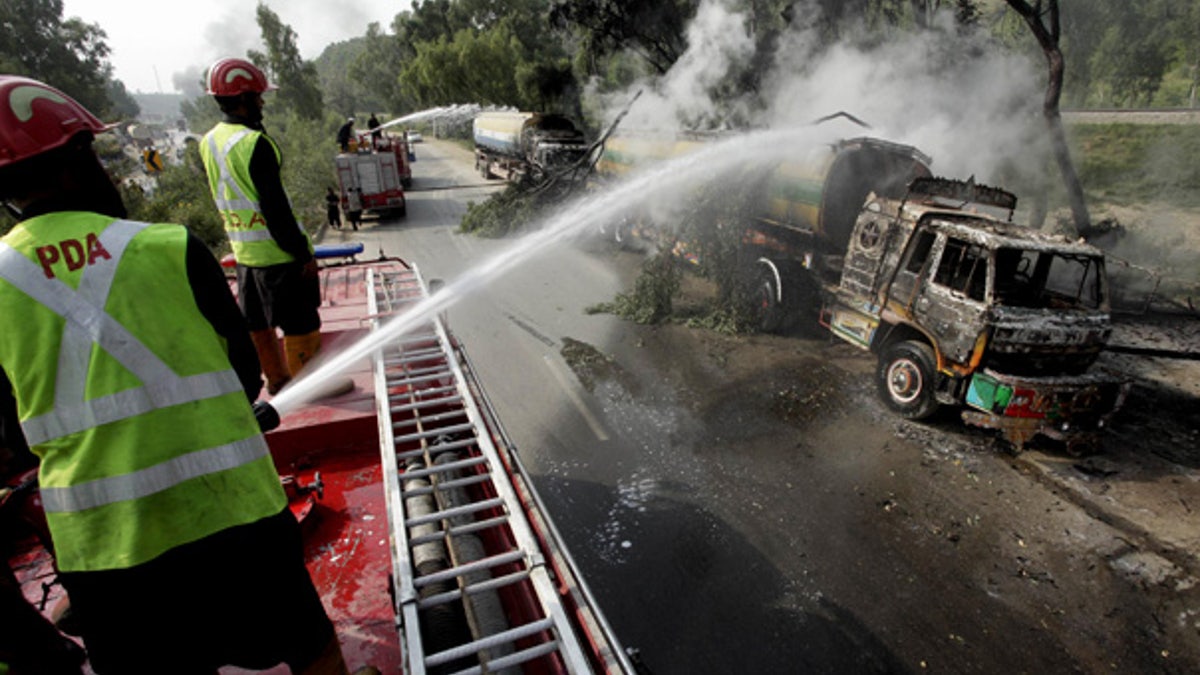
Thursday: Pakistani fire fighters try to extinguish a fire in Khairabad near Peshawar, Pakistan, after gunmen torched a dozen tankers carrying fuel to NATO troops, police said. (AP)
The Pentagon acknowledged Thursday that some parts of Pakistan's intelligence agency are cooperating with terrorist groups as a new report suggests Inter-Service Intelligence agents are working to undermine U.S. and NATO forces in Afghanistan.
Spokesman Col. Dave Lapan said the Pakistan intelligence service as an organization does not support terrorism, but some elements within the ISI are providing assistance to terrorists.
U.S. officials have raised concerns about whether some members of the ISI "might be interacting with terrorist organizations in ways that aren't consistent with what the government and military are doing," Lapan said.
Lapan was responding after a report in The Wall Street Journal that suggested the ISI is pushing the Taliban to keep fighting in Afghanistan, undermining efforts by the Pentagon to end the war.
The Journal quotes an Afghan commander in Kunar province who said the ISI is still urging and paying Taliban to fight NATO soldiers.
Pakistan's top military leadership is working to correct the problem, Lapan said, but "like any large organization, change is difficult and comes slowly."
"The ISI has done a great deal in fighting terrorism. Some have said they probably have killed more terrorists than any other organization. But we also have some concerns with the strategic focus of the ISI," Lapan said.
Lapan spoke as U.S.-Pakistani relations remain strained over the effort to end the Taliban's use of Pakistan as a safe haven to launch attacks into Afghanistan.
White House Press Secretary Robert Gibbs said Thursday that President Obama has not spoken to Pakistani President Asif Ali Zardari but a Pakistani delegation is due in Washington later this month as part of a continuing strategic dialogue.
Other strains have added to the burden on U.S.-Pakistani ties recently. On Wednesday, the U.S. apologized for a Sept. 30 attack that killed two Pakistani border guards. Expressing condolences, the U.S. said the helicopters mistook them for insurgents being pursued across the border from Afghanistan.
On Thursday, Pakistani officials said they are still weighing when to open the Torkham border crossing along Kyber Pass, which was closed as a result of the U.S. attack. Pakistan Foreign Ministry spokesman Abdul Basit said authorities were still evaluating the situation and would make a decision "in due course."
Torkham is a major supply route for NATO trucks shipping supplies to troops in Afghanistan Military officials insist closing the crossing hasn't hampered supply chains, but truck convoys are something of sitting ducks as hundreds of vehicles are backed up at the border. Pakistani militants torched 70 NATO trucks Wednesday in Pakistan -- the sixth set of attacks on NATO convoys in the past week.
The CIA continues to operate its own drone attacks on suspected terrorists, including one believed to have struck Thursday that targeted a vehicle in the North Waziristan tribal region where Taliban militants are based. The strike would be the sixth suspected missile attack this month, following what is believed to be 21 similar attacks in the region in September.
As the troubled relationship evolves, one senior Pakistani official told The Wall Street Journal that Islamabad is fighting militants, not aiding them.
"Whenever anything goes wrong in Afghanistan, ISI is to be blamed," the official is quoted saying. "Honestly, they see ISI agents behind every bush in Afghanistan."
Lapan said the U.S. continues to communicate with Gen. Ashfaq Parvez Kayani, the head of the Pakistani Army and former chief of the ISI, and is "comfortable that change will be coming in how the ISI operates."
Speaking after a meeting with Secretary of State Hillary Rodham Clinton, Senate Foreign Relations Committee Chairman John Kerry, D-Mass., said that "the ISI's continued involvement with various entities remains an issue of concern between us."
He added that he is also concerned about Pakistani army attempts to undermine the government, but he doesn't think the army "will move in that type of way."












































